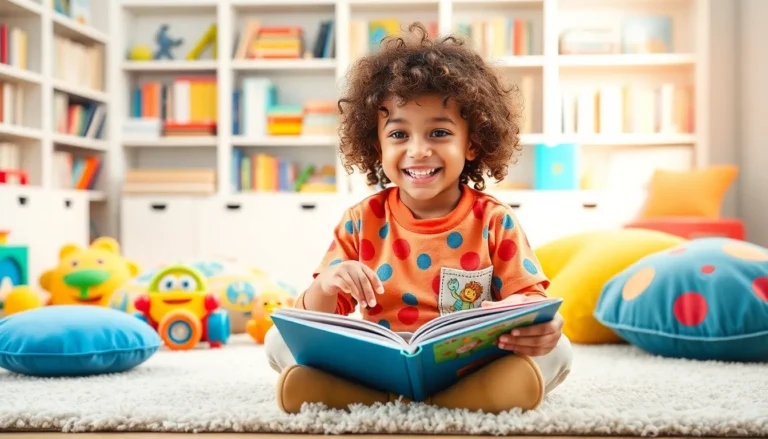Table of Contents
ToggleEvery parent’s journey is unique, but one thing’s for sure: they all have a style. From the helicopter parents who hover like drones to the free-range folks who let their kids roam the wild like modern-day explorers, parenting styles shape not just childhoods but entire lives. It’s like a game of chess, but instead of pawns, you’ve got toddlers throwing tantrums and teens locked in their rooms.
Understanding these diverse approaches can be a game changer for anyone looking to improve their parenting skills. Whether it’s authoritative, permissive, or uninvolved, each style has its quirks and perks. So buckle up and get ready to explore the colorful world of parenting styles, where every choice can lead to laughter, lessons, and a few eye rolls along the way.
Understanding Parenting Styles
Parenting styles play a crucial role in shaping children’s behavior and emotional development. The main styles—authoritarian, permissive, authoritative, and uninvolved—each come with distinct characteristics and implications.
Authoritarian Parenting
Authoritarian parenting emphasizes strict rules and high expectations. Parents maintain control, often using punitive measures to enforce compliance. Children raised in this environment may develop obedience and discipline, but they might struggle with low self-esteem and social skills. Fear of failure often dominates their interactions, impacting their ability to make independent decisions.
Permissive Parenting
Permissive parenting is marked by a lenient approach with few limitations. Parents act more as friends than authority figures, fostering an environment of indulgence. While children benefit from creativity and self-expression, they may also lack self-discipline and struggle with authority. Consequently, behaviors such as impulsivity and poor academic performance may arise, challenging their development.
Authoritative Parenting
Authoritative parenting strikes a balance between expectations and support. Parents provide clear guidelines while encouraging open communication and autonomy. This approach fosters independent thinking, resilience, and social competence in children. Research shows these children typically perform well academically and build healthy relationships, demonstrating the effectiveness of this balanced style.
Uninvolved Parenting
Uninvolved parenting entails minimal engagement or response from parents. Often preoccupied with their own issues, these parents provide little emotional support or guidance. Consequently, children might experience neglect, leading to feelings of insecurity and challenges in coping skills. Long-term effects can include difficulties in forming relationships and low academic achievement, underscoring the risks associated with this style.
Impact of Parenting Styles

Parenting styles significantly influence children’s emotional and behavioral development. Understanding these impacts can guide effective parenting practices.
Emotional Development
Authoritarian parenting often leads to increased anxiety and fear in children due to constant criticism and rigidity. Conversely, permissive parenting may foster low emotional resilience, resulting in challenges when dealing with rules. Authoritative parenting promotes healthy self-esteem as it combines support with reasonable expectations. Uninvolved parenting frequently results in emotional neglect, hindering children’s ability to express feelings and form secure attachments. Research shows that children raised within these frameworks often exhibit distinct emotional responses, highlighting the profound effects of parenting styles on their developmental outcomes.
Behavioral Patterns
Authoritarian parenting typically creates children who comply but may also struggle with rebellion as they grow older. Permissive parenting encourages creativity and spontaneity but can lead to impulsive behavior and difficulty in delaying gratification. Authoritative parenting effectively balances discipline and freedom, resulting in children who display strong self-control and social competence. Uninvolved parenting can cause children to exhibit withdrawal and behavioral issues due to the lack of guidance. Overall, different parenting styles result in various behavioral patterns, emphasizing the necessity of understanding these styles for better child development.
Examples of Parenting Styles in Different Cultures
Cultural backgrounds significantly influence parenting styles. Variations in approaches highlight diverse values and practices across societies.
Western Parenting Approaches
In Western cultures, parenting often emphasizes independence. Authoritative parenting is prevalent, characterized by a balanced mix of expectations and support. Many parents encourage children to express their opinions, fostering creativity and self-reliance. For instance, children are taught to voice concerns and negotiate rules, instilling confidence in their decision-making. The permissive style also appears, allowing kids significant freedom while promoting exploration. Consequently, children sometimes struggle with boundaries and self-discipline. Overall, Western parenting approaches often prioritize individualism and self-expression.
Eastern Parenting Approaches
Eastern cultures generally stress collectivism and respect for authority. Authoritarian parenting frequently emerges, with high expectations and strict discipline. In these settings, obedience is vital, shaping children’s behavior through clear boundaries. Many parents instill values such as hard work and respect for family traditions. For example, compliance with parental directives is seen as a sign of filial piety. Authoritative styles may also appear, though they often integrate more hierarchical elements. Emotional support exists, yet it typically centers on academic success and societal contributions. In essence, Eastern parenting approaches highlight interdependence and communal values.
Choosing the Right Parenting Style
Choosing a parenting style requires careful reflection on one’s values and the unique needs of a child. Prioritizing flexibility and adaptability can greatly enhance the effectiveness of any approach.
Flexibility in Parenting
Flexibility in parenting enables caregivers to adjust their methods. Adapting to changing circumstances creates a nurturing environment for children. For instance, a parent might employ authoritative techniques most of the time but shift to permissive tactics during special family events. Being open to change allows parents to address their child’s evolving emotional and developmental needs. Encouraging communication fosters trust and strengthens bonds between parent and child. Each family dynamic varies, so flexibility ensures that parenting styles resonate with every child’s personality and circumstances.
Adapting to Your Child’s Needs
Adapting to a child’s needs involves recognizing individual differences. Identifying traits like temperament and learning styles informs how parents approach discipline and support. Observing reactions to different scenarios also plays a crucial role. For example, a child struggling with anxiety may benefit from authoritative parenting, which combines support with structure. Noticing when a child requires more independence versus guidance enhances their emotional growth. Tailoring parenting techniques ensures that children feel seen and understood, promoting resilience and emotional intelligence. Fostering this adaptability leads to healthier relationships and personal development.
Understanding the nuances of different parenting styles is crucial for fostering healthy child development. Each style presents distinct advantages and challenges that can shape a child’s emotional and behavioral outcomes. By recognizing these dynamics parents can make informed choices that align with their values and their child’s unique needs.
Flexibility in parenting approaches allows caregivers to adapt and create supportive environments that nurture resilience and emotional intelligence. Ultimately, the goal is to cultivate strong relationships that empower children to thrive as they grow.







